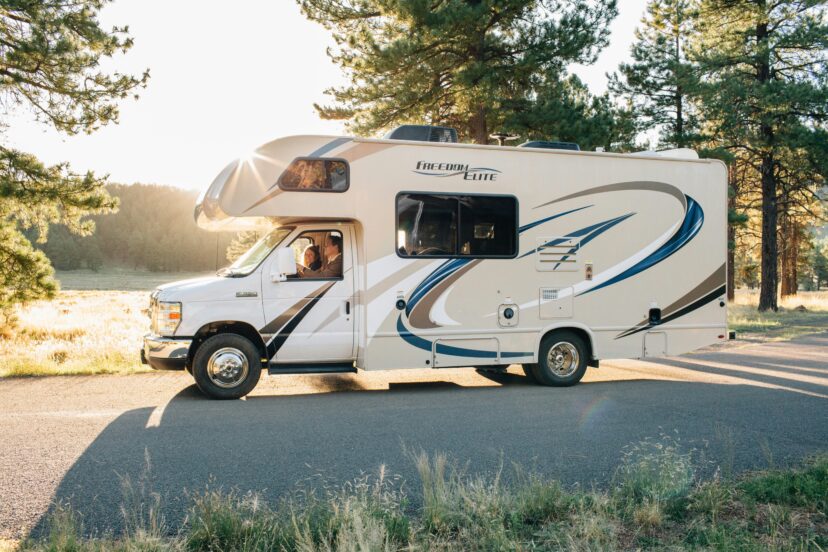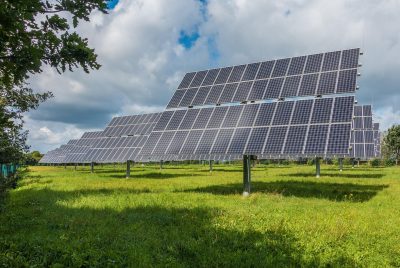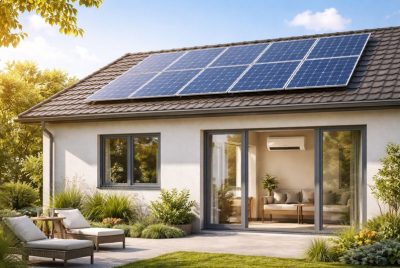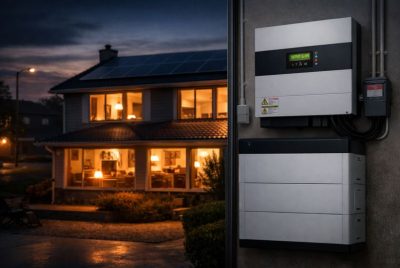How to Choose the Best Portable Solar Power for Your RV Adventures
One of the most liberating sensations is taking an RV vacation. The dream is the freedom to travel wherever you choose, the beautiful scenery, and the open road. Running out of electricity, however, is one thing that might seriously ruin your trip. Having dependable energy is essential whether you’re parked at a campground or in the middle of nowhere. Portable solar power can help with that. Don’t worry if you’re unsure about how to pick the ideal portable solar power for your RV. In the most straightforward manner possible, this tutorial will walk you through each stage of the process.
What is Portable Solar Power for RVs?
Although it may seem difficult, portable solar power is actually very easy to use. This device enables you to harness sunlight and convert it into electricity for your recreational vehicle. Imagine that even if you are parked far from the electrical grid and in a remote location, you still need to run the lights, charge your electronics, and keep your refrigerator cold. Your answer is to use portable solar panels. They maintain everything functioning properly by absorbing solar energy and storing it for you to utilize whenever you need it.
Why is Portable Solar Power Important for RVs?
Being in the middle of nowhere without a way to keep your food fresh or charge your phone is, let’s face it, the worst. Even though you may be in a stunning, isolated location off the grid, everything else collapses without electricity. You may use portable solar electricity to operate equipment like your refrigerator or fans, run lights at night, and keep your gadgets charged. It keeps you cozy, connected, and prepared for adventure—it’s like having your own tiny power plant in the middle of nowhere.
How Do Solar Panels Work for RVs?
The basic idea behind solar power for your RV is that sunlight is captured by solar panels, which then transform it into electricity that is stored in batteries for later use. Think of the panels as enormous sponges that absorb sunlight and convert it into energy that can be used. When you require power for tasks like charging your phone or turning on your lights, you can draw on the energy that is stored in the batteries. No matter where you are, it’s a simple and effective technique to maintain the energy flow in your RV.
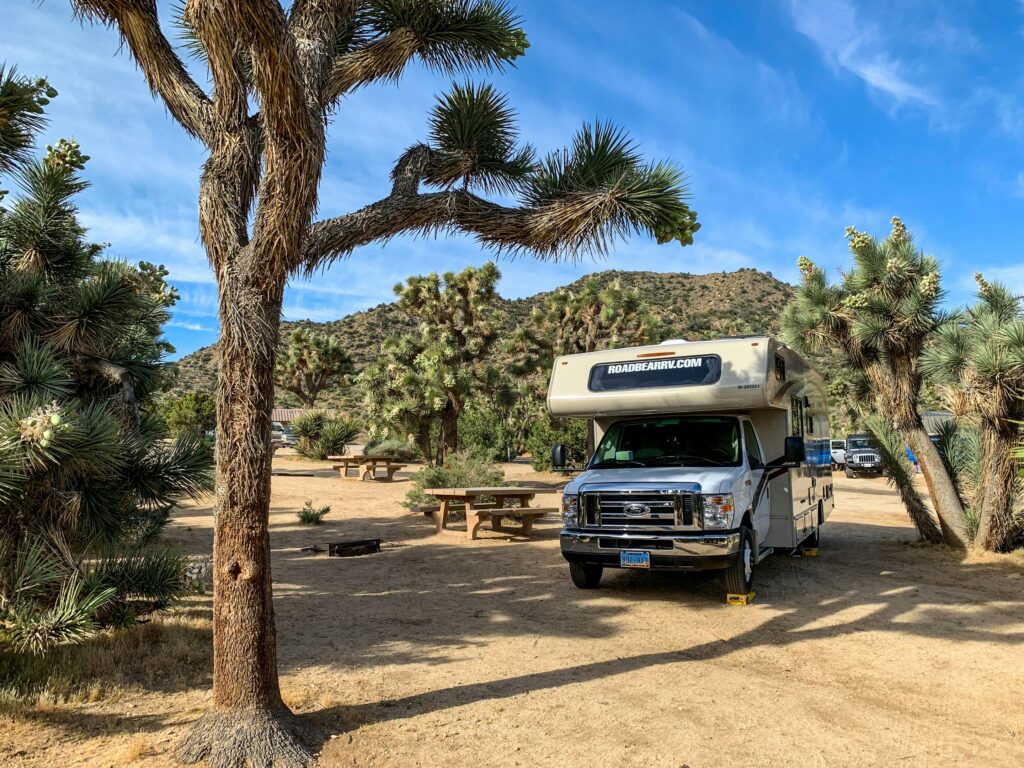
Types of Portable Solar Panels for RVs
Foldable and rigid solar panels are the two primary varieties available for RVs. If you enjoy moving about and don’t want a large setup, foldable panels are ideal because they are lightweight and incredibly portable. Comparable to the Swiss Army knife of solar power, they are small, multipurpose, and convenient to keep. Rigid panels, on the other hand, are better for longer stays or for those who require steady, dependable electricity because they are more robust and provide more power. Although they are a bit bigger and heavier, they accomplish the job well.
Assessing Your Energy Needs
Determine how much power you truly require before making a purchase of a solar system. Do you need to keep your air conditioner and refrigerator running, or are you only charging your phone and powering a few lights? The size of the system you require depends depend on how much energy you use on a daily basis. It’s similar to packing for a trip in that your bag gets bigger the more items you bring. You’ll be one step closer to choosing the ideal solar system if you take a time to think about your energy requirements.
Calculate the Size of Your Solar Power System
It’s time to figure out how much energy you’ll need now that you know what you’re powering. For example, it takes 240Wh of energy to run a 60W light for four hours. You may estimate the size of your solar system by multiplying this by the number of devices you plan to use. It’s an easy calculation, but it’s important since it will help you determine how many solar panels and how much batteries your RV needs.
Understanding Solar Panel Efficiency
Here’s something to keep in mind when choosing your solar panels: efficiency. The amount of sunshine that a solar panel can convert into useful electricity is known as its efficiency. Panels with higher efficiency take up less space while generating more power. If you’re tight on space, a high-efficiency panel might be your best option. However, keep in mind that with higher efficiency comes a higher price tag. It’s all about finding that balance between cost and power output.
Battery Capacity and Storage
Batteries are just as important as the solar panels. After all, you can’t use the power your panels collect unless you have somewhere to store it. That’s where batteries come in. You’ll need a battery that can store enough energy to meet your needs. Lithium-ion batteries are popular because they’re compact, charge quickly, and have a long lifespan. A good battery setup means you’ll have enough juice to keep things running smoothly, even when the sun goes down.
Portable Solar Generators: An All-in-One Solution
If you want a hassle-free, all-in-one solution, portable solar generators might be the way to go. These systems combine solar panels, batteries, and inverters into one compact package. All you have to do is connect the panels, and you’re good to go. It’s like a plug-and-play system that’s perfect for RVers who want something easy to set up and use. No wiring, no complicated installation — just power when you need it.
Solar Charge Controllers: Why You Need Them
A solar charge controller is an essential piece of equipment in your solar setup. It’s the middleman between your panels and your battery, ensuring that the power from the panels is fed into the batteries at the right rate. Without it, your batteries could get overcharged or undercharged, which would reduce their lifespan and efficiency. Think of the charge controller as a traffic cop, making sure the power flows smoothly without causing any accidents.
Inverters: Converting DC to AC Power
Most RVs run on DC power, but many of your devices — like laptops or microwaves — run on AC power. That’s where an inverter comes in. An inverter converts the DC power from your batteries into AC power that can be used by your appliances. It’s like a translator for electricity, making sure your devices get the right kind of power they need to run smoothly.
Portability and Weight Considerations
One of the main advantages of portable solar systems is their, well, portability. If you’re always on the move, you want a setup that’s lightweight and easy to transport. Foldable panels are great for this because they’re easy to store when not in use. But if you’re planning to stay in one place for a while, rigid panels might be a better option because they’re more powerful and durable. It’s all about weighing your need for portability with your energy requirements.
Durability and Weather Resistance
When you’re out on the road, your solar panels are going to be exposed to all kinds of weather. Whether it’s heavy rain, intense heat, or gusty winds, you need panels that can withstand the elements. Look for weather-resistant panels that are designed to last. The more durable your setup is, the longer it will keep performing, no matter what kind of conditions you’re facing.
Budget: Finding the Right Balance
Budget is always a factor when choosing a solar system. You can find affordable solar panels, but remember that the cheaper options might not be as efficient or durable. On the other hand, more expensive systems tend to have higher efficiency and longer lifespans. It’s important to find a balance between your needs and your budget. Think of it like buying a new car — you want something reliable but don’t necessarily need the most expensive model.
Brand Reputation and Reviews
When shopping for solar systems, it’s always smart to go with reputable brands. You want something that’s been tried and tested, and the best way to do that is to read customer reviews. People who’ve used the system in real-world conditions will give you a pretty good idea of how it holds up. It’s like asking a friend for a recommendation — you want to go with something you can trust.
Easy Setup and Installation
Nobody wants to spend hours trying to figure out how to set up their solar system, especially when you’re on the go. Look for a system that’s easy to install, with clear instructions and minimal effort required. The quicker you can get your solar panels up and running, the more time you’ll have to enjoy your adventure.
Safety and Regulations
Safety should always be a priority. Make sure the solar system you choose is certified and meets safety standards. Look for certifications like UL (Underwriters Laboratories) to ensure that everything is up to code. Also, check local regulations, as some areas may have specific rules about solar panel use.
Maximizing Solar Efficiency
To get the most out of your solar setup, make sure your panels are positioned properly. Direct sunlight is key, so avoid shading from trees or other objects. Even a small shadow can significantly reduce the power output. Think of it like getting the perfect tan — the more direct sunlight, the better!
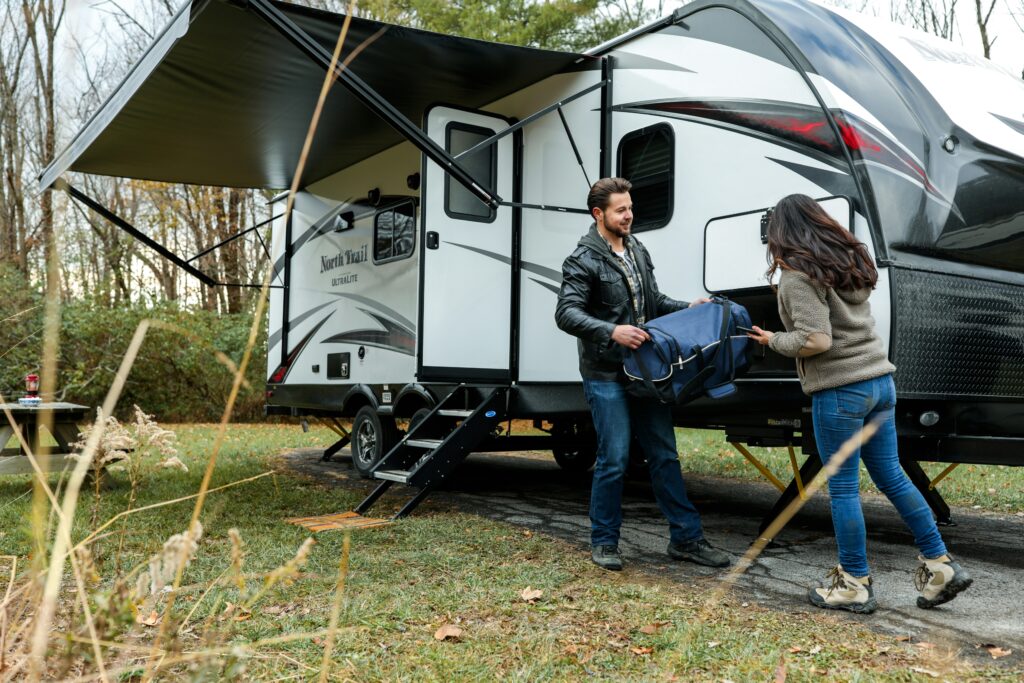
Top Portable Solar Power Products for Your RV Adventures
Here are five highly-rated portable solar power products on Amazon that can make your RV adventures even better. Whether you’re looking for a lightweight option or something with more power, these products cover a wide range of needs for RVers.
1. Renogy 400W Lightweight Portable Solar Suitcase
This foldable solar panel system is designed for outdoor activities, including RV camping. It features an IP67 waterproof rating, ensuring durability in various weather conditions. The kit includes sturdy kickstands for easy setup and is known for its quick installation process.
2. Renogy 200W Portable Solar Panel
Ideal for RVers seeking a balance between portability and power, this foldable panel boasts an IP65 waterproof rating. It’s compatible with various power stations and is praised for its efficiency in charging devices during outdoor excursions.
3. DOKIO 160W 18V Portable Solar Panel Kit
Weighing only 9 pounds, this folding solar charger is equipped with two USB outputs, making it suitable for charging 12V batteries and power stations. Users appreciate its lightweight design and ease of setup, making it a favorite among RV campers.
The Jackery SolarSaga 100 impressed testers with its lightweight design and efficient energy conversion, making it a top choice for camping and RVing.
5. Renogy 100W 12 Volt Portable Solar Panel
This foldable solar suitcase comes with a waterproof 20A charge controller and adjustable kickstands. It’s suitable for charging power stations and is favored for its portability and user-friendly setup, making it a practical choice for RV enthusiasts.
In-Depth Insights on Portable Solar Power for RVs
When considering portable solar power for your RV, it’s helpful to look at both firsthand experiences and expert advice. One great resource is the article “Portable Solar Panels—Two Weeks Off-Grid Testing, and Lessons Learned”, which provides a detailed account of real-world testing of portable solar panels over a two-week off-grid experience. The author shares practical insights on how these systems perform, the challenges faced, and key lessons learned, making it an essential read for RV owners considering solar setups. Additionally, the “RV Solar Panels: A Must-Read Guide (With Expert Advice)” offers a comprehensive guide to choosing the best solar panels for your RV. This expert-driven guide covers everything from the different types of solar panels to essential components and expert tips for selecting a system that best suits your needs. These resources combine both practical experience and expert knowledge, making them invaluable for anyone looking to integrate solar power into their RV adventures.
Conclusion: Power Your RV Adventures with Confidence
Choosing the right portable solar power system for your RV doesn’t have to be overwhelming. By understanding your energy needs, considering the different components, and doing some research, you’ll be able to pick the best system for your adventures. With the right solar setup, you’ll never have to worry about running out of power again, allowing you to enjoy the open road with confidence.
FAQs About Portable Solar Power for RVs
- How many solar panels do I need for my RV? It depends on your daily energy consumption. Calculate the wattage of your devices, and choose a system that meets your energy needs.
- Can I use portable solar power to run my air conditioner? Running an air conditioner requires a large solar setup. It’s possible, but you’ll need a substantial battery bank and high-output panels.
- Are portable solar systems easy to set up? Yes, most systems are designed to be user-friendly and easy to set up. Unfold the panels, connect to the batteries, and you’re good to go!
- Do portable solar panels work on cloudy days? Yes, they still work, but their efficiency is reduced. The more direct sunlight, the better.
- How long will a portable solar system last? Your solar system should last 20–25 years with the right maintenance, and batteries usually need to be replaced after 5–10 years.

